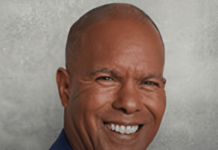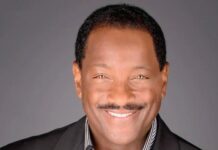
*Six-time AUDELCO Award-winner and acclaimed actor, Jerome Preston Bates, stars in Richard Wesley’s AUTUMN, presented by The Billie Holiday Theatre of Brooklyn, NY.
Directed by Walter Dallas, AUTUMN also stars LeKethia Dalcoe, Terria Joseph, Brent Langdon, Dorian Crossmond Missick and legends Count Stovall and Pauletta Pearson Washington, wife of Oscar winner Denzel Washington. AUTUMN runs through November 6th at Brooklyn’s Long Island University’s Kumble Theater.
Lauded for his extensive work in theater, Bates stellar list of credits includes: Broadway’s
Seven Guitars and Stickfly. His other Off-Broadway and regional theater productions include Macbeth, Joe Turner’s Come and Gone, King Lear and FENCES. Bates has also appeared in numerous primetime television programs including HBO’s OZ, Law and Order: SVU, NYPD Blue, just to name a few.
In this edition of Inside Broadway, Gwendolyn Quinn talks with Bates about AUTUMN and its parallels of today’s politics and the current election. Bates plays Franklyn, a Mayor of a major urban city. “AUTUMN addresses the responsibility of candidates in positions of power,” says Bates. “And it also reflects on the power of politicians, the abuse of power, and how it affects not only the people they serve but also their immediate circle, their cabinets, their families.” Bates also shares his thoughts on the Presidency of Barack Obama, his theater project on music icon Jimi Hendrix and his next move on The Great Way White.
Inside Broadway: What was it that attracted you to this project?
Jerome Preston Bates: I had performed Autumn at Crossroads Theatre Company and I worked with Crossroads before. What really attracted me was the playwright Richard Wesley, who I respect and had done some of his work in the past, the complexities of the character [Franklyn] and where that could go in terms of creating a character.
IB: What kind of director is Walter Dallas?
JPB: Walter Dallas is an excellent director. I call him, “The Quiet Storm.” I was fortunate to be cast by Walter in Pill Hill. I was also a part of the original cast of Seven Guitars by August Wilson, that starred Viola Davis and Ruben Santiago-Hudson at the world premiere in Chicago. But I also call Walter, “The Quiet Storm,” because he’s very particular about what he wants. He’s very quiet and he gets it done. Even if he has to be emphatic to get his point across. He can do that as well and you don’t see it coming. But all the time he’s meticulous, getting all the details of the storytelling, as well as the character development and the staging, and before you know it, you have witnessed a remarkable excellent director.
IB: During this election season, and as an American citizen, what are you most concerned about as it relates to the future of this country?
JPB: I’m concerned that someone in power has to lead and be concerned for the people and not for themselves. We need the concerns of the people to be addressed in all areas of life, particularly for our youth. In addition to the concerns of the nation, you need better foreign trade deals and financial stability. We need our politicians to reach out and deal with issues of the disenfranchised and the working class people who are living from paycheck to paycheck with hopes of sending their kids to college or families simply trying to put food on their tables.

IB: Over the course of your lifetime, what political figure do you feel changed the course of history and politics in this country and why?
JPB: I have to lean towards a figure who’s not considered a political figure, but who changed the politics and history of this country. Dr. Martin Luther King was able to instill self-respect and self-determination. I believe what he did in his life changed the course of the history or began the dream of a greater American and ultimately a greater world.
IB: As we approach the end of President Obama’s term in office, tell us your thoughts on his Presidency.
JPB: I think he did the best he could with what he had considering the opposition that he had against him. I think some things didn’t work and a lot of things did. I think he presented himself even better than expected in terms of what he was able to accomplish or able to put on the table. But overall I think he had more of the positives stacked up than the negatives. He is an upright straightforward family man, loves his family, and loves the people that he served. And one of the most emphatic, dynamic, personable, political figures I’ve ever witnessed in my lifetime.
President Obama is accessible. It was amazing that we had a President that was so human, yet his accomplishments were as equal as anybody before him. I’m sorry to see him go. I wish he could serve eight more years.
IB: You have been developing your own theater projects. Tell us about them and your plans to produce them.
JPB: I’ve always been interested in Jimi Hendrix. What was so powerful to me about Jimi Hendrix was that he had a three year recording career. Three years and he impacted the world with his musicianship and his writing. And what really attracted me to Jimi Hendrix was that the person he was, was totally opposite of what he was presenting as a musician. Jimi Hendrix was a crossover artist. We had people who had crossed over like Sammy Davis, Jr. and others, but nobody crossed over like Jimi Hendrix. As a matter of fact, he came out of the gate with more international followers and Caucasian followers than he had African American followers. But what is pushed under the rug is that he had more African American followers than what was really exposed. What we’ve been told and what we continue to see is a wild drugged out and freaked out person. He was a genius, a humble, kind and intelligent man who got thrust into the corridors of super stardom and it eventually killed him.
He’s in the same league with Mozart, Coltrane, Bach, Beethoven and Ellington. I love telling that story because the era in which he rolled through was the civil rights era. The early 60s, The Beatles, after The Beatles came in and Jimi Hendrix came through, and changed the course and sound of music period. The loud guitar wails were nowhere present until Jimi Hendrix came and the intricacies of how that blended into the music.
I liked the dynamics of the spiritual man, in conflict with the worldly man. And so stories like Jimi Hendrix, Otis Redding, and Sam Cooke are very important to me to begin to produce. I’ve had some success with Jimi Hendrix taking it to Amsterdam and had one invitation to Paris and produced it earlier in New York.
IB: So who would you like to play Jimi Hendrix?
JPB: I would have to discover that person. Fifteen years ago, I handed a script to Terrence Howard. At that time, I thought he was perfect for it. One time I talked to Laurence Fishburne who was looking for a script. André 3000 did a Jimi Hendrix film two years ago. The same guy that wrote 12 Years a Slave did a Jimi Hendrix story, but they couldn’t quite tell it all because they didn’t have the rights to the music. Jimi Hendrix was a genius. He played with his left hand. He turned the guitar upside down and played the guitar behind his back and with his teeth. He had all kinds of melodies from hard rock to soul, to rhythm and blues. He’s one of the greatest guitarists ever.
IB: Who is your favorite playwright and why?\
JPB: It would probably be August Wilson because I knew him. I had a chance to create one of his characters. I had a chance to see a bit of his writing style. I had a chance to sit around and talk to him, laugh with him, and joke with him. He’s a great playwright and has a Broadway theatre named after him. August Wilson wrote ten plays successfully written through each century and I was fortunate and blessed enough to hear that, be there, live that, see that, and to appear in his plays Seven Guitars, Two Trains Running, Fences, and Joe Turner’s Come and Gone. His storytelling about the African American experience from every level, economically, politically, socially, and also the tales of religion and folklore of the African American experience. And, then Shakespeare would be a close second. Now, all of the incredible stories that came out of his writing pen.

IB: As an actor, who would you like to work with and why?
JPB: I’m a big fan of Robert DeNiro. I love his investment into each character. I followed him throughout his career. I’m a big fan of Denzel Washington because he represented my generation, but he represented excellence, and he represented consistency. And he always came to work and he gave it his all. And being that I was a part of his generation, I met him when he was doing When the Chickens Come Home to Roost. I got a chance to see his rise, but at the end of the day, he’s one of the greatest actors period, and he just happens to be African American. Cate Blanchett is another incredible actress that I would love to work with. Kate Winslet is an incredible actress that I would love to work with too. I’ve had the great fortune of working with Viola Davis and Kerry Washington. I’m open and respectful for anybody. I’m blessed to be a part of anything as an actor, particularly those who have survived in this business.
IB: At this point in your career, what are some of the projects you would like to work on?
JPB: You know, things that I create and projects by people that are invested in the perfection of the craft and stage. I like to come to the table with some of the best in the business, directors, actors, screenwriters, and playwrights. So whatever’s handed to me that’s amongst the thriving or the best in the business, I’m so grateful for that and so open to the new voices. There are a lot of wonderful new voices that are rising. A lot of wonderful talented people, and young people that are writing as well.
IB: What’s your favorite medium?
JPB: I’m grounded in theater and I’m always working on theater projects. My favorite is movies. When I was in college, I used to shoot my own movies and show them to the students.
IB: What advice do you have to offer for young African American talent interested in careers in theatre, film and television?
JPB: To be specific in terms of what you want to do. Really understand that there’s no overnight success. Really understand that you have to be invested in committing to the perfecting of the craft. The journeyman days are over when the journeyman would put the work in and eventually got the big break. Now young people are shooting movies on their phone, on their iPad. Movies are going directly to cable channels as opposed to networks. So create your own project. Don’t wait around for people to hand you anything. But also study, to show yourself a pro in your acting, or your playwriting, or your directing. Be serious about it. Talk to people who are doing it. And there are no shortcuts. Realize that the business doesn’t love you, but we love it. But through prayer and hard work your gift will make room for you.
IB: In recent years, do you feel opportunities for African American talent have advanced? If so, in which mediums do you feel provide the best opportunities?=
JPB: Opportunities have advanced to some degree, but the thing is to create your own opportunities. The vehicles are there, but African Americans now have to bring their opportunities to pass as opposed to having someone put a check by their name or by their project, inviting them to the table. Invite yourself to the table. Create your own table.
IB: Who’s your mentor?
JPB: Right now, it’s a few. Walter Dallas, my Pastor Dr. Judy Brown, Pastor Dr. Pedro Jones, and Pastor John Traub. My spiritual life has to be right before anything else can be invited in my life.
IB: What is the best advice you received to date and from whom?
JPB: My aunt told me when my mom died, “You’ll never forget her, but you’ll learn to live without her.”
IB: What’s next for you?
JPB: Too quick to announce, but I’m getting ready to join a Broadway show. And I will be with Autumn through every cycle of its progression.

Gwendolyn Quinn is an award-winning media specialist with a career spanning over 25 years. She is the founder of the African American Public Relations Collective (AAPRC) and the publisher of Global Communicator. Her weekly columns, “Inside Broadway,” “The Living Legends Series,” and “My Person of the Week” are published with EURweb.com. Quinn is also a contributor to Souls Revealed and Handle Your Entertainment Business. She is the curator of The Living Legends Foundation’s “The State of Black Music and Beyond” essay series. Contact her at [email protected].
We Publish News 24/7. Don’t Miss A Story. Click HERE to SUBSCRIBE to Our Newsletter Now!





